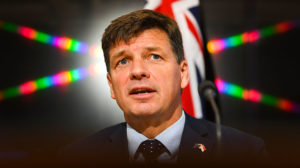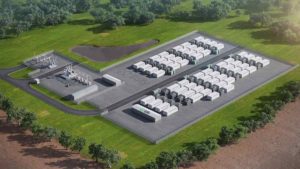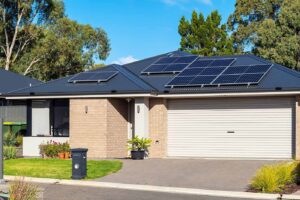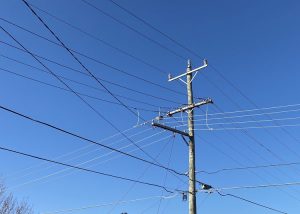Tony Abbott’s Renewable Energy Target review panel appears destined to do what it was created to do – to recommend closure of Australia’s last significant climate and clean energy scheme to new entrants.
The Australian Financial Review, in a front page report, on Monday confirmed the worst fears of the renewable energy industry when it said that the panel had been “instructed” by Tony Abbott to look at ways for the scheme to be folded.
This is shocking news, because it will bring to an end a $20 billion industry, and cost thousands of jobs, and force household and business bills to soar. It was immediately branded as a “reckless” idea, and as “economic vandalism” by the Clean Energy Council.
But it should not be surprising news. The intent of the Abbott government towards renewables was made clear by its refusal – despite a statutory requirement to do so – to commission the Climate Change Authority to conduct the review.
Instead, it appointed a panel composed of climate skeptics, pro-nuclear advocates and fossil fuel lobbyists. The biggest beneficiaries of a decision to close the scheme to new entrants will be the fossil fuel generators, who according to new analysis released on Monday, will see their earnings boosted by up to $10 billion – the big three retailers, AGL Energy, Origin Energy and EnergyAustralia, being the biggest beneficiaries.
And such a decision will satisfy the right-wing ideologues and deep-lined antipathy to renewable energy within the Abbott government, and its determination to kill the remnants of the Labor/Greens “Clean Energy Future” package. The AFR also repeats what has long been suspected, that Environment Minister Greg Hunt – and Industry Minister Ian Macfarlane – have been effectively sidelined from the process, despite the issue crossing into their portfolios.
 The PM’s office has had carriage of the project since the start, and his intentions have long been clear. The secretarial support has been housed within Abbott’s office – and within reach of his principal business advisors – including climate denier and renewables opponent Maurice Newman, and Abbott’s own energy advisor, former AGL executive Sarah McNamara.
The PM’s office has had carriage of the project since the start, and his intentions have long been clear. The secretarial support has been housed within Abbott’s office – and within reach of his principal business advisors – including climate denier and renewables opponent Maurice Newman, and Abbott’s own energy advisor, former AGL executive Sarah McNamara.
The AFR suggests that Joe Hockey – who says he finds wind turbines “utterly offensive”, and another noted anti-renewables finance minister Mathias Cormann, are also having a large say in proceedings. Hunt, who has constantly vaunted his ability to influence the outcome, is said by the AFR to be “unhappy”.
But government insiders who have worked on the RET Review have told RenewEconomy that the intent of the review has always been to cut the current 41,000GWh target to a maximum of 25,000GWh (what might be called a “true” 20 per cent target), and possibly close it to new entrants altogether.
The tenor of the “consultations” also confirmed this view. The panel members, Dick Warburton and Shirley In’T Veld, the former head of coal generator Verve Energy, have made their climate skeptic views very clear. Economic rationalist Brian Fisher, who has done extensive modeling for parties opposed to the RET, has also not hidden his opposition to the mechanism.
There were glimmers of hope that the RET could be retained, particularly when the panel’s own modeling dismissed the two major arguments to drop the target – that the target could not be physically met, and that it would be costly to consumers. The ACIL Allen report said there would be no issue meeting the 41,000GWh target, if the policy intent was made clear and soon, and that even based on its own conservative inputs, consumers would be better off in the long term from having more renewables in the grid.
Instead, the new argument was based around a “transfer of wealth” from the generators to consumers. But even then, the report is believed to have favoured a “scaling back” of the target to 25,000GWh or 27,000GHW – a position said to be favoured by Hunt.
The irony is that even though the panel members appeared firmly opposed to the RET, they still recommended that it should be kept – even if scaled back. This, insiders say, was not good enough for Abbott’s hard core insiders, who insisted it must go.
The report by Jacobs, on behalf of The Climate Institute, Australian Conservation Foundation and WWF-Australia says that the biggest beneficiaries to dumping the RET would be the fossil fuel generators. The Jacobs report suggested $8 billion in additional profits to coal-fired generators out to 2030 and an extra $2 billion to gas generators.
AGL Energy – presuming it completes the purchase of Macquarie Generation’s 4.6GW of coal generators in NSW – would pocket an extra $2.7 billion, EnergyAustralia would an extra $2 billion boost and Origin Energy a $1 billion boost. All three companies have been active in their opposition to the RET, and to subsidies for small-scale solar in particular.
Although, the RET Review panel was not due to deliver its final report to Abbott’s office until later July, it was always going to “consult” with draft findings before that delivery. That is when the RET Review panel was instructed to “look more closely” – as the AFR puts it – on the option to close the target to any new entrants, and possibly to await the result of Australian Energy Market Operator estimates which showed no new capacity is needed on the eastern states grid for at least another 10 years. The fossil fuel generators, who are largely responsible for that excess capacity, fear that more renewables means more early closures for ageing coal plants.
Whether the Abbott government finally agrees with a scale backed target or an effective closure, any changes seem likely to be blocked in the Senate, where the Palmer United Party has promised to side with Labor and the Greens.
But it matters not. The large-scale renewable energy industry has already ground to a halt. No new projects have reached financial closure since the election of the Abbott government, and the Abbott government knows that even by doing nothing – apart from allowing continued uncertainty – no new projects will come to market.
Households will also be affected. Through rooftop solar, they have so far contributed more than $12 billion of the $18 billion invested in renewables over recent years, initially driven by generous feed in tariffs and then as a hedge against rising electricity prices once those tariffs were removed.
The government, though, can remove some of those remaining incentives that defray the upfront cost of the system, without needing legislative changes. Industry experts say that could cause the rooftop solar market to fall by one-third or even a half, with the loss of thousands of jobs.
Meanwhile, state governments – with huge vested interests in state-owned networks and generators – continue to act against renewables. The WA government is even canvassing importing coal from Indonesia rather than develop renewable energy projects at home, while in Queensland, businesses have been hit by a whopping $500-a-day service charge (essentially to read the meter) to dissuade them from installing solar.
The renewable energy industry – which possibly unwisely sought to negotiate a “compromise deal” with the big three utilities in 2013 – said a move to halt the target would be “devastating” to the industry.
“Such a move would be reckless, given the government’s own analysis shows slashing the RET would save no money on power bills, yet would devastate billions of dollars of investments made in good faith in renewable energy projects across the country,” acting CEO Kane Thornton said.
“Hundreds of Australian and international investors have built their businesses based on the strong bipartisanship of this policy which has existed in legislation since 2001.
“Tearing up this bipartisanship, and the policy itself, would show that the Australian energy sector is clearly not open for business – it would stop industry dead and smash investments that have already been made.”
Indeed, some international groups such as US solar developer Recurrent Energy have already packed up. Others, including Goldwind and Trina, have warned of the potential fallout, while Australian groups Pacific Hydro and Infigen Energy are directing their efforts overseas.
The Australian Solar Council echoed the CEC remarks. It is taking its “Save Solar” campaign to marginal electorates, with the first stop at the northern Brisbane seat of Petrie, held by the LNP’s Luke Howarth, in Thursday this week. The ability to make solar a potent political issue – many marginal electorates boast more than 20 per cent solar penetration – appears to be their last resort.
“Solar saves money, creates jobs and shifts votes. The Abbott Government is about to find out how much Australians love solar and the Renewable Energy Target,” CEO John Grimes said.







